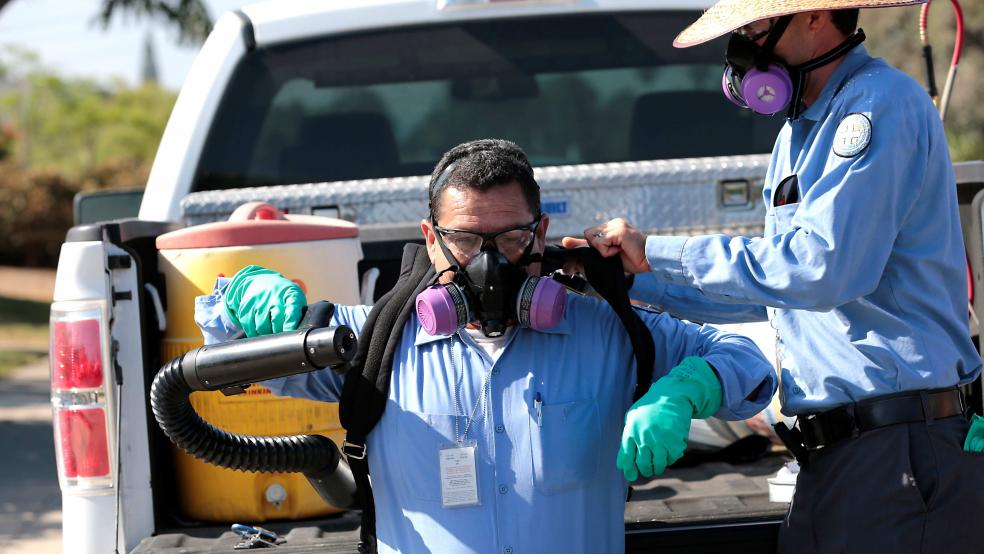Members of Congress are returning to town on Tuesday after a month and a half recess. They face a raft of urgent spending issues before they depart yet again to campaign for reelection in November, but none may be more important than funding to stop the spread of the Zika virus.
In a particularly bad show of concern about this mounting public health threat, lawmakers left town shortly before the Republican and Democratic national conventions in mid-July without resolving a major partisan spending conflict over combatting the dreaded Zika scourge.
Related: The Senate Dithers Again as Zika Virus Continues to Spread
The virus is spread throughout the world by mosquitos, sexual contact and blood transfusions and is especially dangerous for pregnant women who face the possibility of giving birth to babies with a head-deforming disease known as microcephaly. The disease has devastated families in Puerto Rico and is gradually spreading through southern Florida, posing a threat to both public health and the state’s vibrant tourism industry.
President Obama and federal disease control officials have been demanding congressional action since February. However, about $1.1 billion in funding for mosquito abatement and other measures to combat the spread of the virus bogged down in a partisan dispute over Republican efforts to block spending for Planned Parenthood and weaken Clean Water Act regulations
Senate Majority Leader Mitch McConnell (R-KY) and Senate Democratic Leader Harry Reid of Nevada spent weeks blaming each other for the impasse and departed Washington without resolving the differences after two unsuccessful votes to end a Democratic filibuster. The House previously approved the measure, and House Speaker Paul Ryan (R-WI) has said he has no interest in reopening the conference report.
Before Congress adjourned for the summer, McConnell took steps to hold another procedural vote shortly after Congress returned from its lengthy vacation. Late last week, a spokesman for McConnell was skeptical that the Democrats would end their filibuster and go along with the current language of the spending package. However, a senior Senate Democratic aide said that “There are good discussions going on between Senate Appropriators on Zika.”
Related: Disease Target No 1: Stop Zika Before It Spreads Beyond Florida
But overshadowing the Zika funding dispute is the larger question of how to go about funding the government beyond the Sept. 30 deadline for a new fiscal 2017 budget. In the highly charged environment of the presidential and congressional races, lawmakers on both sides of the aisle typically laden spending bills with policy measures to advance their agendas.
Congress will rush to approve as many of the dozen annual appropriations bills for operating the government and funding a myriad of programs as it can. Until now, however, the House has passed just five appropriations bills and the Senate has passed only three. With time running out, Congress will have little choice but to approve a stop-gap continuing resolution to keep the government from shutting down before a final agreement can be struck.
Even under the best of circumstances, year-end spending negotiations are fraught, and vulnerable to political assaults from the left and right. For example, conservative groups are pressing GOP leaders in the House and Senate to postpone final action on new spending until after a new president and a new Congress take over next January.
Democrats and some Republicans favor getting the work done before the end of the year, by passing a short-term patch and then grinding out a final comprehensive agreement after the Nov. 8 election in a lame duck session. However, many of the 40 members of the ultra-conservative House Freedom Caucus are opposing that approach, insisting that it would simply allow Democrats to push for extra spending and concessions to special interest groups just ahead of the Christmas or New Year’s holidays, according to The Washington Post.
Related: Big Deficits Loom as Candidates Pile on Spending and Tax Cuts
Last week, 33 conservative organizations led by Americans for Prosperity and Freedom Partners waged a letter-writing campaign on Capitol Hill urging lawmakers to approve stop-gap legislation that would keep the government operating at current funding levels through early 2017 when a new Congress can complete the work. The group is backed by conservative industrialists and philanthropists Charles and David Koch.
Among other issues likely to get congressional attention this fall:
- Gun control – House Minority Leader Nancy Pelosi (D-CA) and Rep. John Lewis (D-GA) haven’t given up their fight for on a bill to expand background checks and prevent people on government terrorist watch lists from purchasing guns. Ryan and other Republicans oppose the measures, as does the powerful National Rifle Association.
- Criminal Justice Reform – Roll Call reports the House will take up major legislation to overhaul the criminal justice system. The House Judiciary Committee has approved four related bills so far and hopes to add two more to the package before final floor action.
- Mental Health Reform – The House has already passed its version of a bill to address the nation’s mounting mental health problems, but the Senate is still struggling to come up with an alternative version. Many are skeptical a final agreement can be reached before the end of the year.
Related: Fiscal Neglect -- Watchdog Hits Trump and Clinton for Ignoring $19 Trillion Debt
- The Water Resources Development Act -- McConnell will press for a vote on legislation that authorizes 25 critical Army Corps projects in 17 states. The projects, which have undergone congressional review, are designed to strengthen the nation’s infrastructure, protect lives and property, restore vital ecosystems and maintain commercial navigation routes.





